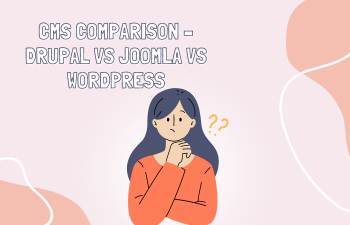- May 28, 2011September 26, 2024
- by uwtin
CMS comparison – Drupal vs Joomla vs WordPress
WORDPRESS
WordPress is the world’s most popular content management system. It started out as a platform exclusively for blogging, but has grown and advanced significantly over the years. Today, over 40% of sites using CMS’s are using WordPress. In addition, over 60 millions websites are using WordPress which shows just how popular it is. WordPress offers many advantages to those looking to create a website, including the following:
Easy to Install – Many web hosting companies offer automatic installation of WordPress sites, which means you can have a new site up and running in well under five minutes. Even with manual installation, you can create a new site in less than a half hour.
- Easy to install.
- Easy to administer.
- Easy to add popular and common features.
- Easiest learning curve; ideal for those with little to no technical background.
- Strong SEO capabilities.
- Highly flexible (blog, eCommerce, website, etc.)
- Does not require coding to edit.
- Easy posting using WYSIWG interface.
- Stable plug-in API architecture (i.e. easy to develop plugins)
- Websites can be completely customized through the use of widgets and plug-ins.
- Most extensive number of extension vendors and themes.
- Extensive support via Google searches.
Drupal is the second most popular content management system available today. It is a fully open-source program, which many people prefer, especially those who are more technically minded.
The Drupal platform is extremely powerful, and is less resource intensive than that of WordPress. Drupal can be set up for anything from a simple blog to a content portal used by large corporations. Some of the most significant benefits to Drupal include the following:
Technically Advanced – Drupal is the most technically advanced of these three content management systems. It doesn’t use nearly as many system resources as WordPress, so people won’t have to worry about upgrading to a more expensive hosting option as quickly.
- Steep learning curve.
- Requires code (lacks editor tools such as WYSIWG)
- Difficult to use for those without technical backgrounds/knowledge.
- Developers forced to create their own solutions.
- Lack of free plugins.
- Lack of themes (great designers necessary).
- Posting requires setting options for URL Alias, Menus, Revision Logs, Comments, and Author Meta data.
- Lacks in terms of unofficial support beyond the main documentation.
JOOMLA
Joomla is often thought of as the compromise between WordPress and Drupal. It is a powerful content management system, which can run smoothly on most web servers without any problems. It doesn’t require the same level of technical experience to run as Drupal, but it still offers many of the extra features. Like Drupal and WordPress, Joomla does have a lot of plug-ins and themes available to choose from, so you can customize your site to look and function in any way you desire. Other reasons people choose Joomla to include:
Social Networking – This is perhaps the biggest benefit of Joomla. Of the three, Joomla makes it the easiest to create social networks. Social networks can be a powerful asset for many sites, and with Joomla, you can have one up and running extremely quickly and easily.
- Easy to install.
- Ideal for those who fall between tech-pros and tech-newbies.
- Strong content management capabilities.
- Automatically creates responsive sites.
- Thousands of features and designs.
- Extensive plugin (‘extensions’) library.
- Strong well maintained support communities and forums
The Conclusion?
When it comes to a pure website application, Joomla comes out tops – the code is stronger, there are more features, and it is growing and expanding as a platform on an almost constant basis, which makes it easier to adapt to the ever-changing requirements of large-scale websites.
However, if you are looking for a basic website or blog that looks like a website, and you want something quick, easy, and simple, WordPress is more than up to the job.
More often than not, creating and launching a website with Drupal requires IT professionals as this program lacks editor tools such as WYSIWYG and uses code instead. With its foundation in code, Drupal is difficult to use for those without technological backgrounds or knowledge and the learning curve is so steep it may as well be vertical
Of the three, you will need more technical skills to manage and maintain a Joomla or Drupal site, so if you are worried about your skill, it might be better to opt for the simpler WordPress option.
In all, both of these CMS packages are great, easy to use, adaptable, and low cost. Decide whether you need a monstrous, mega site, or a simpler site that showcases your business in the best light, and then work from there. Joomla is up to managing just about anything, including thousand-page mega sites, while WordPress will give you a clean, stylish and simple business site without breaking a sweat.
 Wordpress
Wordpress

